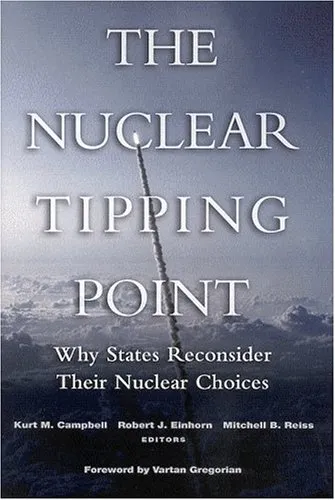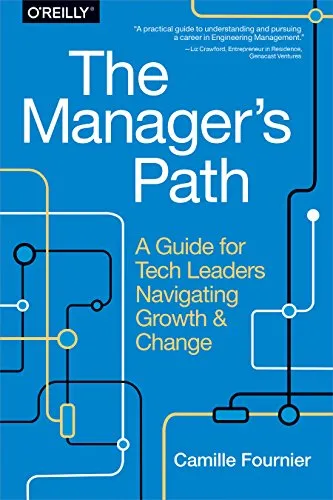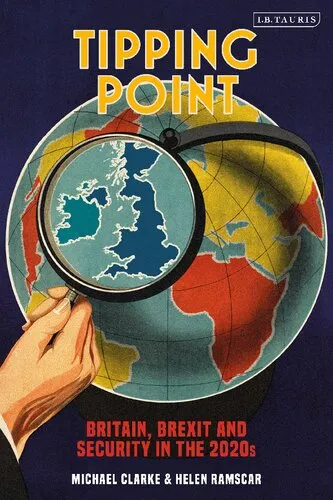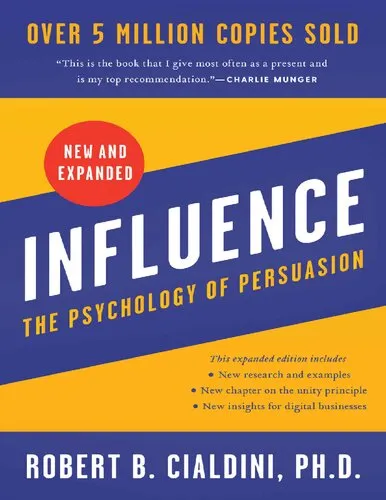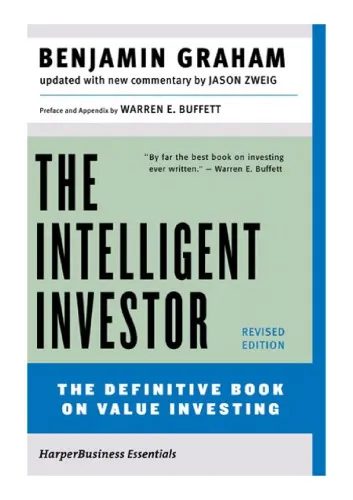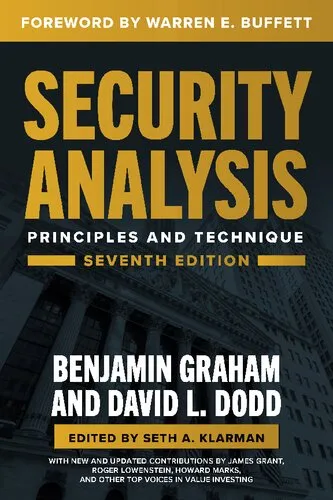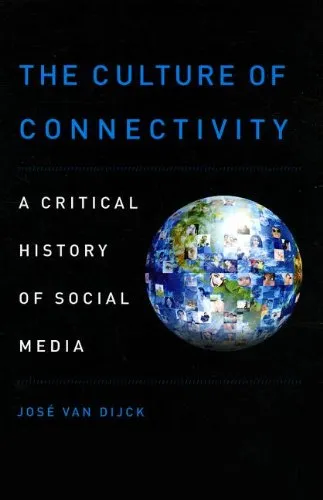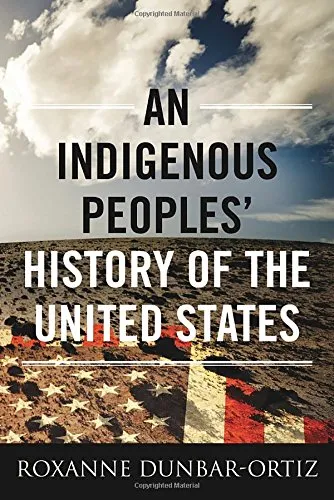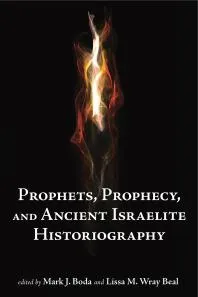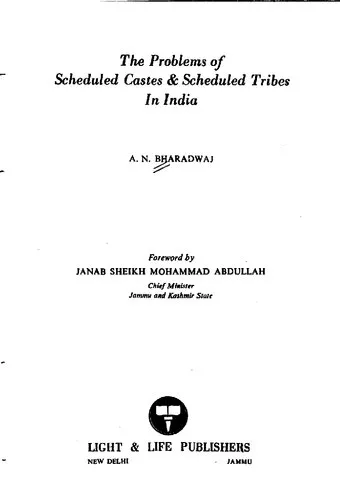The Nuclear Tipping Point: Why States Reconsider Their Nuclear Choices
4.0
بر اساس نظر کاربران

شما میتونید سوالاتتون در باره کتاب رو از هوش مصنوعیش بعد از ورود بپرسید
هر دانلود یا پرسش از هوش مصنوعی 2 امتیاز لازم دارد، برای بدست آوردن امتیاز رایگان، به صفحه ی راهنمای امتیازات سر بزنید و یک سری کار ارزشمند انجام بدینکتاب های مرتبط:
معرفی کتاب
کتاب «The Nuclear Tipping Point: Why States Reconsider Their Nuclear Choices» به بررسی دلایل و شرایطی میپردازد که باعث میشوند کشورها تصمیم بگیرند در مورد سیاستهای هستهای خود تجدیدنظر کنند. در این اثر، نویسندگان به تحلیل عمیق مسائل سیاسی، امنیتی، و اقتصادی پرداخته که کشورها را به سمت برنامههای هستهای سوق میدهد یا از آن باز میدارد.
خلاصه دقیق از کتاب
کتاب «The Nuclear Tipping Point» به بررسی تغییرات در تصمیمات هستهای کشورها میپردازد. این تحلیلها به بررسی فشارهای بینالمللی، تهدیدات امنیتی و تعهدات داخلی سیاستمداران مربوط میشوند که باعث میشوند کشورها به دنبال تسلیحات هستهای بروند یا برعکس، از آنها کنارهگیری کنند. نویسندگان تأکید دارند که هر چند موازنه قدرت و عوامل بازدارندگی بسیار مهم هستند، اما تصمیمات معمولاً در یک خلاء سیاسی و امنیتی گرفته نمیشوند و تحت تأثیر بسیاری از عوامل متغیر و پیچیده دیگر میباشند.
نکات کلیدی
- فشارهای بینالمللی و نقش آنها در شکلدهی به سیاستهای هستهای.
- تفاوتهای میان تصمیمگیریهای داخلی و خارجی در برنامههای هستهای.
- آینده سیاستهای خلع سلاح و چالشهای پیش رو.
جملات معروف از کتاب
«تصمیم به دستیابی به تسلیحات هستهای تنها نتیجه یک تصمیم ساده نیست، بلکه حاصل فرآیندهای پیچیده و طولانی مدت سیاسی و اجتماعی است.»
چرا این کتاب مهم است؟
با توجه به افزایش تنشهای منطقهای و افزایش پیچیدگیهای ژئوپلیتیکی در سراسر جهان، درک کامل این موضوع که چرا کشورها ممکن است تصمیم بگیرند به تسلیحات هستهای دست یابند یا از آنها صرفنظر کنند، ضروری است. این کتاب به محققان، تحلیلگران سیاسی و تصمیمگیران کمک میکند تا با درک بهتری از چالشهای امنیت بینالملل، راهحلهای موثرتری را برای مدیریت برنامههای هستهای جهان بیابند.
The Nuclear Tipping Point: An Introduction
Welcome to a profound exploration of nuclear proliferation and international security in "The Nuclear Tipping Point: Why States Reconsider Their Nuclear Choices." Authored by Kurt M. Campbell, Robert J. Einhorn, and Mitchell B. Reiss, this book meticulously examines why certain states teeter on the edge of acquiring nuclear weapons, what catalysts drive these decisions, and how global dynamics shape these choices.
Detailed Summary of the Book
This book delves deep into the complexities behind why states reconsider their nuclear ambitions. Using in-depth case studies and theoretical insights, the authors investigate the multitude of factors contributing to a state's decision to pursue or abstain from nuclear armament. The narrative keenly observes historical patterns, geopolitical tensions, and the underlying motivations of various nations.
The authors argue that nuclear decisions are rarely isolated incidents influenced solely by national security concerns. Instead, they are multifaceted evaluations integrating global standing, economic sanctions, technological abilities, and internal political dynamics. Through a series of expert analyses, the book reveals how balancing these elements becomes crucial in any state's pursuit or abandonment of nuclear capabilities.
Key Takeaways
- Understanding Motivation: Nations' nuclear ambitions are seldom propelled by a single cause but result from a web of influential factors, ranging from security needs to political prestige.
- Policy Implications: The book underscores the importance of effective international policies and diplomatic interventions in mitigating nuclear proliferation risks.
- The Role of Global Dynamics: Changes in global politics, such as shifts in alliances and rivalries, can significantly impact national nuclear strategies.
- Technological Access: Access to or denial of nuclear technology and resources can be pivotal in a state's decision-making process.
Famous Quotes from the Book
“The decision for a state to go nuclear is not made in a vacuum; it is a reflection of complex domestic and international equations.”
“Understanding why states reconsider nuclear choices is essential for predicting and preventing future proliferation crises.”
Why This Book Matters
In an era where nuclear threats remain a substantial part of global security discussions, "The Nuclear Tipping Point" provides essential insights into how states decide to pursue or halt nuclear weapons programs. As international stakeholders strive to prevent proliferation, understanding these processes is vital for developing effective deterrents and ensuring a stable geopolitical environment. The authoritative analyses presented in this book not only enhance academic understanding but also inform policymakers and practitioners on crafting nuanced, impactful strategies.
Furthermore, this text is crucial for readers seeking to grasp the delicate balance that countries maintain between pursuing national security interests and adhering to global non-proliferation norms. It serves as a definitive guide, offering both historical context and future foresight, making it an invaluable resource for scholars, diplomats, and anyone interested in the complexities of international relations and arms control.
دانلود رایگان مستقیم
شما میتونید سوالاتتون در باره کتاب رو از هوش مصنوعیش بعد از ورود بپرسید
دسترسی به کتابها از طریق پلتفرمهای قانونی و کتابخانههای عمومی نه تنها از حقوق نویسندگان و ناشران حمایت میکند، بلکه به پایداری فرهنگ کتابخوانی نیز کمک میرساند. پیش از دانلود، لحظهای به بررسی این گزینهها فکر کنید.
این کتاب رو در پلتفرم های دیگه ببینید
WorldCat به شما کمک میکنه تا کتاب ها رو در کتابخانه های سراسر دنیا پیدا کنید
امتیازها، نظرات تخصصی و صحبت ها درباره کتاب را در Goodreads ببینید
کتابهای کمیاب یا دست دوم را در AbeBooks پیدا کنید و بخرید
1585
بازدید4.0
امتیاز0
نظر98%
رضایتنظرات:
4.0
بر اساس 0 نظر کاربران
Questions & Answers
Ask questions about this book or help others by answering
No questions yet. Be the first to ask!
